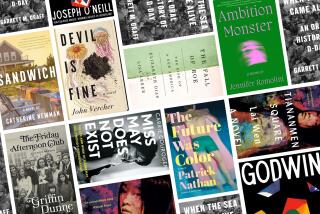Op-Ed: When Bloomsday became Zoomsday
- Share via
On the calendar of literary high holy days, June 16 reigns supreme. It’s the date in 1904 on which Irish novelist James Joyce set his novel “Ulysses.” Lovers of the book call it Bloomsday after Leopold Bloom, the novel’s central character, and find all kinds of ways to celebrate the seemingly average day lived by its characters.
“Ulysses” is set in Dublin. Joyce boasted that, should the Irish city ever be obliterated, it would be possible to reconstruct it just from the pages of the book. As his characters move through the city — Bloom, his wife Molly, and the semi-autobiographical Stephen Dedalus — they connect and interweave with their fellow Dubliners in ways that define density and urbanity. They share newspapers, take communal meals, gossip, run errands, attend funerals, ride public transportation, begin love affairs, visit brothels and drink copiously.
Some of those activities mark Bloomsday celebrations globally. The revels range from public readings in bars to retracing Bloom’s or Stephen’s wanderings through Dublin to annual migrations of Joyce scholars to whichever university has invited them. They present papers and share their obsessions for about a week, including the occasional late-night game of Joyce charades, where the trick is to come up with the dirtiest bits for the other team to act out. (How would you perform “scrotumtightening sea”?)
But this year the party, like so much else, will move online. Zoomsday, as it’s been dubbed, will be virtual. Folks will commune around the world while sitting safely at home. They’ll enjoy songs and readings from quarters both expected (Dublin) and not (a reliably excellent lineup in Buffalo, N.Y.).
My Zoomsday contribution will be a commemoration of a beloved Joyce mentor and friend, John Bishop, who died last month of COVID-19. He taught at UC Berkeley and if you were lucky enough to be his student, you learned more than literature. His brilliance, generosity and sense of play channeled Joyce’s uniquely comic vision of love and death. His landmark book dealt with “Finnegans Wake,” Joyce’s infinitely complex final novel, though later the work that drew him as a scholar was “Ulysses,” with all its fidelity to daily life.
That presentation of daily life is exactly what makes “Ulysses” a challenge to read. Its many ways of showing us how we think, from present sensations to past memories, can be confusing at first, especially when Joyce keeps changing the game on us in each successive chapter. And some of the countless jokes in “Ulysses” can be formidable. For example, Bloom muses about his “hi grade ha” upon returning home, the final “T” rubbed off the inner band through years of use.
The rewards of the book vastly outweigh the effort of getting to know it. To “read” Molly, Stephen and Bloom is to encounter them as real people — so much so that my students frequently regret toward the end of the book that they can’t know what happens next. I have to remind them that it really is fiction.
Joyce’s conflation of life and art is built on a multitude of shared human experiences, appetites and intimacies, so many of which have been upended now. It is faithful, as well, to personal isolation and sorrow, states particularly relevant to 2020. In a loud and crowded hotel bar, beset with knowledge that this afternoon is the moment when his wife is beginning an adulterous affair, Bloom sinks: “All is lost.”
When the public again returns to full contact — with embraces and smooches, and eating together — what will matter most is not the freedom to shop without masks, or to fly without fear. What we’ll be hungry for is the strength of culture to pull us together. As with the study and love of a difficult author, those concerts and movies and cultural gatherings will again become the commonality through which we define our lives.
“Ulysses” has a fabulous statement along these lines, silently spoken by Stephen Dedalus. Stephen is thinking of how Shakespeare and all great art takes readers not only up to our most exalted condition, but also back to our existence at its most ordinary. It goes like this: “Every life is many days, day after day. We walk though ourselves, meeting robbers, ghosts, giants, old men, young men, wives, widows, brothers-in-love, but always meeting ourselves.”
In spirit at least, that is what Bloomsday usually is, and what we have to look forward to when the pandemic ends — by next year, we hope, and especially the one after that, 2022, the centenary of the publication of “Ulysses.” In Los Angeles, far from Dublin, UCLA and the Huntington Library, Art Museum, and Botanical Gardens will mount celebrations in the book’s honor. Those of us who treasure Joyce will meet each other again, in our city, in his city and all the others presently invisible to us. All is not lost.
Colleen Jaurretche is continuing lecturer in English and writing at UCLA. She is co-founder of Libros Schmibros Lending Library and has just published her most recent book on Joyce, “Language as Prayer in Finnegans Wake.”
More to Read
A cure for the common opinion
Get thought-provoking perspectives with our weekly newsletter.
You may occasionally receive promotional content from the Los Angeles Times.










